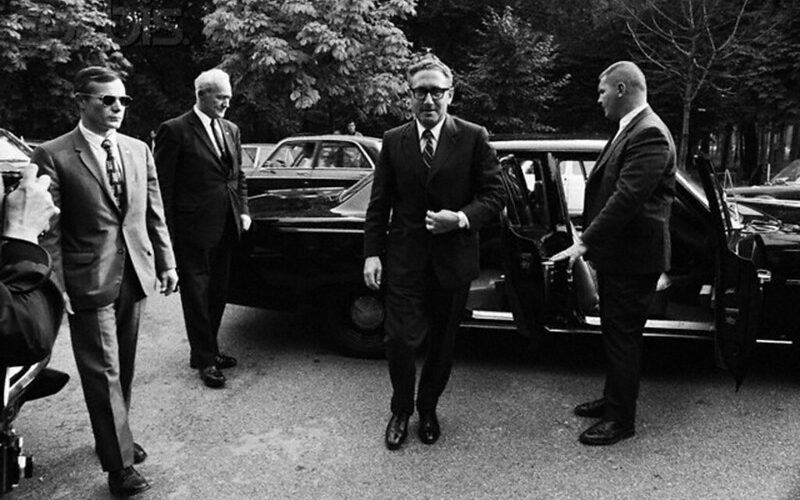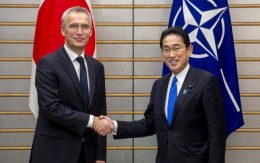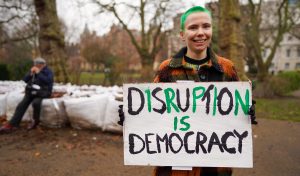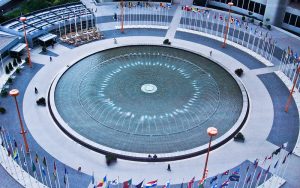Henry Kissinger is one of the most renowned statesmen in the world. He has been active in U.S. politics and foreign affairs since the mid-1960s, he served as the Assistant to the President for National Security Affairs and U.S. Secretary of State during both the Nixon and Ford presidential administrations.
He has been a geopolitical consultant and highly sought-after foreign policy theorist since the late 1970s, upon his retirement from government service, teaching at prestigious District of Columbia universities, served on the boards of and advising multinational Fortune 500 companies, and being an unofficial international relations guru to presidential candidates and global leaders.
This past week, Kissinger turned 100 years old, becoming the last surviving member of Richard Nixon’s Cabinet.
Kissinger has remained a force in American politics and heavily influencing policy abroad and being sought for his insights by presidents as politically diverse as George W. Bush and Donald Trump to Barack Obama and Bill Clinton.
However, a critical examination of his life and work is needed.
The Crimes of America’s Statesman
Henry Kissinger is a war criminal who has engaged in some of the most egregious crimes against humanity and overseen and engineered some of the greatest geopolitical disasters in U.S. history.
Even before he was a public servant, Kissinger engaged in one of the most serious actions one can engage in against their own state: treason.
During the 1968 U.S. Presidential Election, Richard Nixon, the Republican candidate and former Vice President, was trailing slightly behind Hubert Humphrey, the Democratic candidate and current Vice President under Lyndon Johnson, in what would be a close race. President Johnson had announced a halt to the bombings in North Vietnam while the peace talks in Paris had begun showing fruit.
Nixon ordered members of his campaign to secretly contact South Vietnam’s President Nguyen Van Thieu and ask him to pull out from the negotiations, in return for gaining a better deal with the North once Nixon was in office. Kissinger, who had been on the fence between the Humphrey and Nixon campaigns (being valuable to both camps), contacted one of Nixon’s aides and offered “to furnish [the Republicans] with covert information on Johnson’s moves … [guiding] the Republicans secretly on the Vietnam issue for two months” and gaining Nixon’s trust.
Using the information provided by Kissinger, which included his travels to Paris to speak with the negotiators, Nixon (through a friendly contact with South Vietnam’s President) was able to convince Thieu to extricate himself from the peace talks. This information was uncovered by the National Security Agency (NSA) and Central Intelligence Agency (CIA) which then relayed the information to President Johnson. Johnson, in discussion with Senate Minority Leader Everett Dirksen, called the incident “treason” to which Dirksen agreed, yet did not reveal the information publicly due to concerns about revealing the source of information.
While some historians have argued that this event did not damage Humphrey’s campaign, it is without question that, legally speaking, every member of the Nixon campaign who engaged in this operation knowingly engaged in violations of U.S. federal law.
After Nixon’s election, Kissinger was selected to be Nixon’s Assistant to the President for National Security Affairs (also known as the National Security Advisor), then later became the U.S. Secretary of State, at one point holding both titles simultaneously. From 1969 to 1977, Kissinger redefined the office and widened the role of the position more than any individual before him.
In 1971, amidst the Vietnam War, a crisis erupted between East Pakistan (now the country of Bangladesh) and Pakistan. The Pakistani government, on orders from President Yahya Khan of Pakistan, began a military mission explicitly against the Bengalis following a political victory by Bengali nationalists. This effort was highlighted by acts of genocide and numerous human rights abuses. The following conflict, in which Bengalis resorted to guerilla warfare against the Pakistani government and were joined by India, resulted in millions of Bengalis displaced and hundreds of thousands of women raped.
Henry Kissinger repeatedly ignored official cables by the State Department which called the events occurring a “genocide” and had the officials who sent such cables recalled and blacklisted. Pakistan, at this time, was an incredibly close U.S. ally, receiving weapons and economic support and, at various times, Kissinger supported senior Pakistani military officers committing war crimes and shut down any dissent or potential information that would cast the Pakistanis in a negative light. Kissinger knew human rights violations were occurring yet repeatedly worked with Nixon to downplay these atrocities.
In regards to Vietnam, from March 1969 to roughly May 1970, Kissinger was a main advocate of bombing Cambodia and eventually convinced Nixon to do so. The mission to bomb Cambodia was “done in secret” as it was “a country the U.S. wasn’t at war with”. This being incredibly illegal and even resulted in many officials of the Nixon administration having their phones tapped in the name of national security. Many experts and researchers state that Kissinger “bears significant responsibility for attacks in Cambodia that killed as many as 150,000 civilians” and note that Kissinger repeatedly has dodged questions on the issue, in many cases responding with vitriol.
In this instance, Kissinger advocated and developed a plan to bomb a country which the U.S. was not in a shooting war with (Cambodia was providing sanctuary to North Vietnamese fighters only), killing an incredible amount of civilians and non-combatants. In 1973, Kissinger was awarded the Nobel Peace Prize for supposedly “ending” the war in Vietnam. His co-award winner declined the award.
Argentina was another battleground for Kissinger. When Argentina’s democratically elected government was overthrown in a military junta in 1976, Kissinger met with Argentina’s new foreign minister and, upon hearing the minister’s qualms with terrorism in the new country (i.e., leftist groups and democratic advocates, hardly individuals advocating violence for a political goal) Kissinger said “If there are things that have to be done, you should do them quickly” providing a green light to Argentina’s campaign of terror which killed 30,000 people. Kissinger further was a frequent guest of Argentinian dictator Jorge Rafael Videla (who was later convicted of murder and abduction) and became a key asset to the Argentinian government during their human rights abuses, encouraging military action against civilians and providing millions in U.S. military aid.
Kissinger further has been involved and implicated in even more genocides, human rights violations, and regimes notorious for their brutality and terrorism against innocent civilians. He encouraged the destruction of Angola into a third-world nation, overthrew Chilean President Salvador Allende and helped in the regime’s international assassination program (which included an assassination in the U.S. capitol). He supported the Kurds of Iraq in rebelling yet abandoned them once Saddam Hussein made a deal with Iran (resulting in repression by Saddam against the Kurds), he had advanced knowledge of Turkey’s invasion of Cyprus yet did nothing (resulting in nearly 200,000 Cypriots displaced) and was a staunch advocate of Indonesia’s Suharto in his invasion of East Timor and even supplied arms to the Indonesian nation knowing they could be used in war crimes and against innocent civilians.
While efforts have been made to hold Kissinger accountable, with French police serving “a formal request for questioning” and being sued in Chilean court, Kissinger remains a free man and, at age 100, is highly unlikely to face any legal repercussions for his actions from 1969 to 1977.
Submit here
Henry Kissinger, War Criminal
Kissinger, in the sense of whether someone is criminally wrong in their actions, is a war criminal.
His actions, many of which he suggested, initiated, and implemented, all contributed, both directly and indirectly, to the deaths of hundreds of thousands at a minimum. He effectively committed treason during the Vietnam War, played with individuals’ lives like they were pawns on a chessboard, and believed the state (and therefore himself) to be above the law. His time in office, while being seen by some as effective (which is certainly a fair point of view in some respects), will be remembered as a time of bloodshed and terror for both those who held Leftist ideals and those who were considered antagonists by numerous right-wing, anti-Communist governments around the globe.
The day Dr. Kissinger dies will be a time of rejoicing and celebration for all individuals: for Americans who lost a family member in the Vietnam War to the orphan whose parents were killed in Cambodia, Bangladesh, and Argentina. It will also be, for those who have sought Kissinger’s counsel and made allies with him, a moment of reflection and consideration of America’s foreign policy in the late 20th century, the lives lost in the name of American adventurism and fear of the other, and how the United States needs to re-examine their foreign policy as the world’s policeman.
Henry Kissinger’s legacy upon the state of American foreign policy is long and dark, drenched in the blood of innocents, and will only become somewhat clean when he is buried in the ground.








Be First to Comment